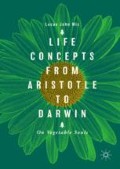Abstract
A second medieval synthesis arose through Muslim transmission of Aristotelian texts. This Aristotelian synthesis maintained subsistent souls but weakened the role of participation in cosmic life. Theologians reinterpreted Aristotle’s four causes, changing souls from dynamic processes into immaterial agents with biological faculties, the ability to cause life activities. Major players included the Islamic philosophers al-Kindî, al-Fârâbî, Ibn Sînâ, and Ibn Rushd and the Jewish theologian Maimonides. They questioned the life and ensoulment of plants as well as the persistence of human individuality after death. Nonetheless the language of vegetable souls and resurrection remained common. Animal souls continued to be taken for granted, including aspects of both will and reason.
Access this chapter
Tax calculation will be finalised at checkout
Purchases are for personal use only
Notes
- 1.
Ammonius wished to reconcile Aristotle ’s prime mover with Plato ’s demiurge in the Timaeus. Philoponus wished to reconcile the prime mover with the Christian God.
- 2.
Al-Fârâbî used the terms irâdah for animals and ikhtiyâr for humans (Ivry 2012).
- 3.
Al-Fârâbî drew on Aristotle ’s division of the soul in the Nichomachean Ethics (I.13), where he identified the animal soul with appetite . Aristotle also mentions the appetite as such in the final chapters of On the Soul, 3, though it is less clear here that it fits neatly into the animal soul .
- 4.
McGinnis (2016) citing The Cure I.5. McGinnis details the significant differences between Aristotle ’s use of ‘nature’ and Ibn Sînâ’s.
- 5.
Volition here is the same irâdah used by al-Fârâbî to describe the lesser agency of non-human animals. Elsewhere, Ibn Sînâ attaches it more closely to the type of agency unique to humans.
- 6.
Philoponus discusses precisely this in his commentary on Aristotle ’s On the Soul; see Blumenthal (1996), p. 119.
- 7.
Tawara (2014). This echoes the skepticism about plant life in On Plants, attributed to Aristotle , but likely written by Nicolaus of Damascus. A translation of the latter work can be found in Barnes 1984.
- 8.
For vegetable souls , see the preface to Mishnah Avot in Commentary on the Mishnah and Eight Chapters, Chapter 1.
- 9.
I am not convinced by Marder’s further claim that Maimonides was motivated by his principle against the mixing of kinds. The avowal of psychic unity seems sufficient.
- 10.
This position is reminiscent of Philo ’s argument about the incorruptibility of stars .
References
Adamson, Peter. “Al-Kindi.” In Stanford Encyclopedia of Philosophy, Spring 2015 ed. Stanford University, 1997–. https://plato.stanford.edu/archives/spr2015/entries/al-kindi/.
Al-Ghazali. The Incoherence of the Philosophers. Translated by Michael E. Marmura. Provo, UT: Brigham Young University Press, 2000.
Blumenthal, H.J. Aristotle and Neoplatonism in Late Antiquity. Ithaca, NY: Cornell University Press, 1996.
Hasse, Dag Nikolaus. “The Early Albertus Magnus and His Arabic Sources on the Theory of the Soul.” Vivarium 46 (2008): 232–252.
Ibn Sînâ. A Compendium on the Soul. Translated by Edward Abbott van Dyck. Verona: Nicolo Paderno, 1906.
Ibn Sînâ. The Canon of Medicine. Translated by Oskar Cameron Gruner. New York: AMS Press, 1973.
Ivry, Alfred. “Arabic and Islamic Psychology and Philosophy of Mind.” In Stanford Encyclopedia of Philosophy, Summer 2012 ed. Stanford University, 1997–. https://plato.stanford.edu/archives/sum2012/entries/arabic-islamic-mind/.
Leunisson, M. “Aristotle and Philoponus on Final Causes in Scientific Demonstrations in APo. II.11.” In Interpreting Aristotle’s Posterior Analytics in Late Antiquity and Beyond, edited by F.A.J. de Haas, M. Leunissen, and M. Martijn, 183–201. London: Brill, 2010.
López-Farjeat, Luis Xavier. “Al-Farabi’s Psychology and Epistemology.” In Stanford Encyclopedia of Philosophy, Spring 2016 ed. Stanford University, 1997–. https://plato.stanford.edu/archives/spr2016/entries/al-farabi-psych/.
McGinnis, Jon. “Ibn Sina’s Natural Philosophy.” In Stanford Encyclopedia of Philosophy, Fall 2016 ed. Stanford University, 1997–. https://plato.stanford.edu/archives/fall2016/entries/ibn-sina-natural/.
Maimonides, Moses. The Guide for the Perplexed, 2nd ed. Translated by M. Friedländer. London: Routledge and Kegan Paul, 1904–.
Maimonides, Moses. The Eight Chapters of Maimonides on Ethics (Shemonah Perakim): A Psychological and Ethical Treatise. Translated by Joseph I. Gorfinkle. New York: Columbia University Press, 1912.
Marder, Michael. The Philosopher’s Plant: An Intellectual Herbarium. New York: Columbia University Press, 2014.
Martin, Raymond, and John Barresi. The Rise and Fall of Soul and Self: An Intellectual History of Personal Identity. New York: Columbia University Press, 2006.
Philoponus. On Aristotle’s “On the Soul” 1.1–2. Translated by Philip J. van der Eijk. Ithaca, NY: Cornell University Press, 2005.
Simplicius. On Aristotle’s “On the Soul” 1.1–24. Translated by J.O. Urmson. Notes by Peter Lautner. Ithaca, NY: Cornell University Press, 1995.
Sorabji, Richard. “The Ancient Commentators on Concept Formation.” In Interpreting Aristotle’s Posterior Analytics in Late Antiquity and Beyond, edited by F.A.J. de Haas, M. Leunissen, and M. Martijn, 3–26. London: Brill, 2010.
Tawara, Akihiro. “Avicenna’s Denial of Life in Plants.” Arabic Sciences and Philosophy 24 (2014): 127–138.
Author information
Authors and Affiliations
Rights and permissions
Copyright information
© 2018 The Author(s)
About this chapter
Cite this chapter
Mix, L.J. (2018). Aristotle Returns: A Second Medieval Synthesis. In: Life Concepts from Aristotle to Darwin. Palgrave Macmillan, Cham. https://doi.org/10.1007/978-3-319-96047-0_10
Download citation
DOI: https://doi.org/10.1007/978-3-319-96047-0_10
Published:
Publisher Name: Palgrave Macmillan, Cham
Print ISBN: 978-3-319-96046-3
Online ISBN: 978-3-319-96047-0
eBook Packages: Religion and PhilosophyPhilosophy and Religion (R0)

